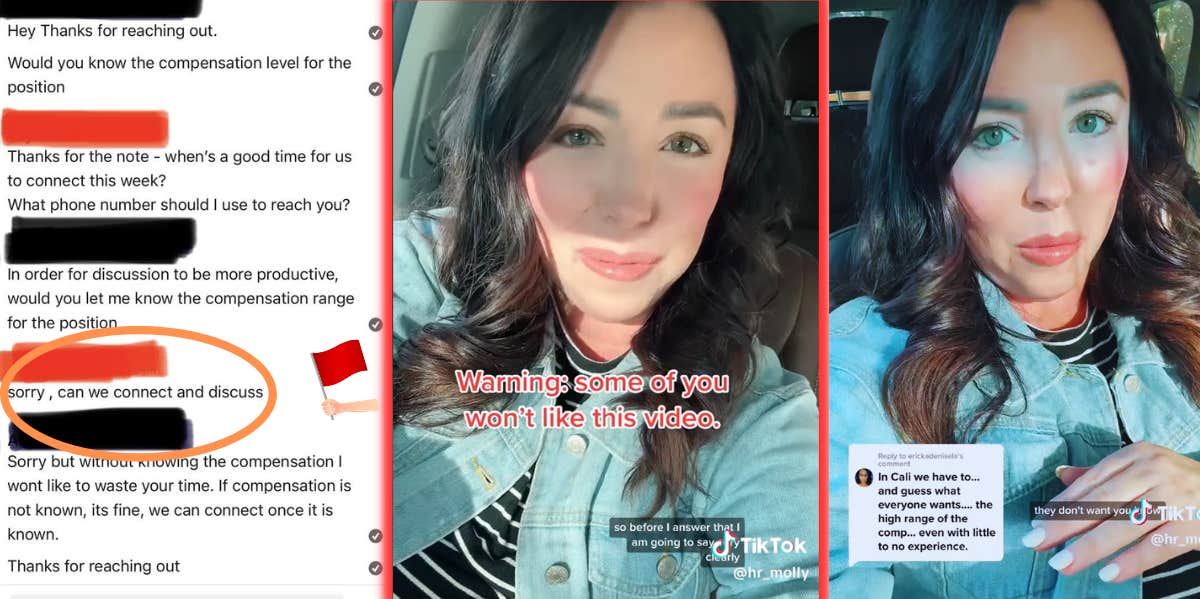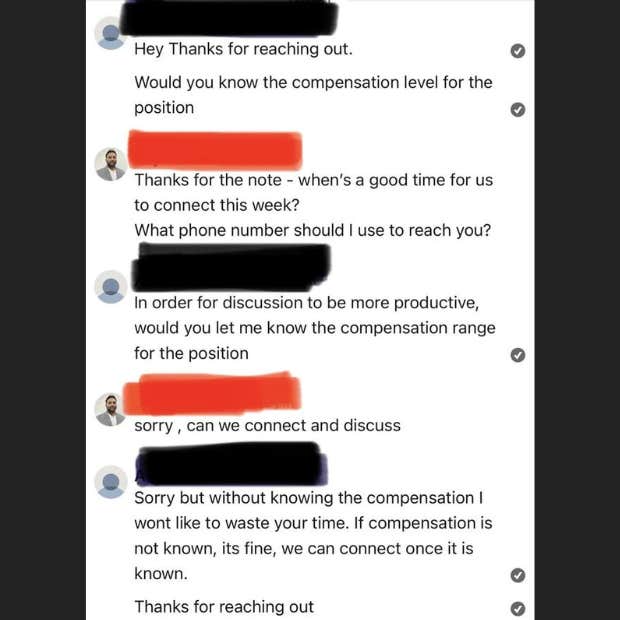Recruiter Refuses To Discuss How Much A Job Pays Before Interviewing A Candidate — Applicant Doesn't Want To 'Waste His Time'
Every employee wants to be paid at the top of the salary range.
 @HR_Molly/TikTok; Reddit via Canva
@HR_Molly/TikTok; Reddit via Canva The job market is always going through a ton of twists and turns as the needs of people and companies change. But one surprising topic that comes up frequently today is recruiters refusing to give prospective employees that salary.
In a LinkedIn message shared online, one job-seeker was left baffled when a recruiter swerve his questions about, let's face it, the most important part of any open position.
The recruiter refused to share the salary information with the applicant.
In the post, titled "Why so secretive about compensation?" the recruiter seemingly ignored that first request for information, glossing right over it and asking for a time to connect and a phone number.
Undeterred, the candidate circled right back and asked for the compensation range before being told, “Sorry, we can connect and discuss.” This effectively ended the interaction.

Photo: Reddit
So, what is the big deal about simply telling applicants how much the job they are interested in pays? The simple answer is the bottom line. By getting you to give your salary requirements first, it tells those recruiting for a company if they need to pay you as much as they thought they did.
When pay is determined by what a potential employee requires, an "ask gap" emerges. Women and minorities tend to ask for less money than their white male counterparts and as time goes on, with raises and promotions, that gap widens.
A TikToker named 'HR Molly' shared her thoughts on why employers won’t post the pay range on job postings.
She makes it perfectly clear that she supports salary ranges being shared but details several valid reasons a company might choose not to do it.
The first concern is that they might be giving away pay practices to competitors. Once the salary range is posted, the competition can make theirs a little higher to attract more applicants. The second reason she gives is much "shadier."
Companies don’t want their tenured employees to know how much they are paying new recruits because oftentimes, it’s more than the people who have been loyal.
According to Molly, when a range is posted, people undoubtedly place their pay requirements at the top of the range. For example, if a job pays between $100,000 and $125,000, most candidates are going to ask for $125,000.
Surprisingly, Molly is not supportive of salary negotiations because she believes it is a symptom of inconsistent pay practices and can result in people that know how to "haggle" getting more pay based simply on their negotiating skills. Studies show that women are much more conservative when negotiating pay, asking for 30% less than men do.
Companies should be transparent with applicants and reduce bias by having pre-determined criteria on base pay. That way, less experienced candidates will fall near the bottom of the pay range while those with extensive expertise will be closer to the top. In addition, specific skills and certifications can be considerations for how much people get paid.
Posting salaries in job postings is just a start when it comes to creating an equitable experience in the workplace. Companies should go a step further by removing compensation bias from the recruiting process to make sure everyone receives fair pay for the work they do.
NyRee Ausler is a writer and author from Seattle. She covers issues navigating the workplace using the experience garnered over two decades of working in Human Resources & Diversity, Equity, and Inclusion.

